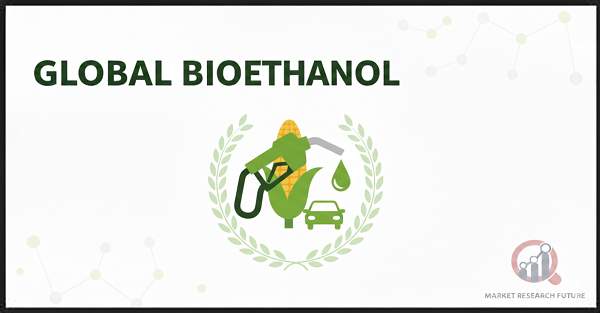Market Research Future (MRFR) has published a cooked research report on the “Bioethanol Market” that contains information from 2019 to 2035.
The Bioethanol Market is estimated to register a CAGR of 6.66% during the forecast period of 2025 to 2035.

Bioethanol Market Highlights
The Bioethanol Market was valued at USD 67.71 Billion in 2024 and is projected to reach USD 137.65 Billion by 2035, growing at a CAGR of 6.66% during the forecast period. This growth is attributed to increasing government initiatives, growing demand for renewable fuels, and the rising adoption of alternative fuel vehicles. Bioethanol, primarily produced from biomass such as corn, wheat, sugarcane, and industrial beet, serves as a clean-burning alternative to gasoline, reducing greenhouse gas emissions and dependency on fossil fuels.
The North American region is expected to dominate the global market, driven by strong maize production, favourable government regulations, and blending mandates that encourage bioethanol use in vehicles. The region’s supportive Renewable Fuel Standard (EPA RFS) has promoted large-scale adoption of bioethanol blends in gasoline. Asia-Pacific, on the other hand, is anticipated to register the fastest growth rate due to increasing government programs in countries like China, India, and Thailand promoting renewable fuel usage and rapid expansion of bioethanol infrastructure.
The European market holds the second-largest share owing to the Renewable Energy Directive (RED) established by the European Union, which mandates the use of renewable energy in transportation. These policies provide a predictable and stable market for bioethanol producers, encouraging investment and innovation.
Technological advancements in fermentation processes, enzyme efficiency, and feedstock diversification—especially the shift towards second-generation bioethanol from non-edible biomass—are strengthening the market’s sustainability and long-term potential. Furthermore, the growing use of flexible fuel vehicles (FFVs), capable of running on bioethanol, gasoline, or both, is further expanding the consumer base for bioethanol and driving global adoption.
Segment Analysis
The Bioethanol Market has been segmented based on Type, Application, and Region.
By Type, the market is categorized into Maize, Wheat, Industrial Beet, Sugarcane, and Cereals & Starch. Among these, the Maize segment dominated the market in 2024, owing to its abundant availability, efficient starch-to-ethanol conversion, and widespread production in the United States. The adoption of dry and wet milling processes for maize-based ethanol production has further enhanced efficiency and profitability.
By Application, the market is segmented into Transportation, Power Generation, Food & Beverages, Industrial, and Medical. The Transportation segment held the largest market share in 2024 due to the widespread use of bioethanol as a blending fuel to meet emission regulations and improve fuel efficiency. Meanwhile, the Power Generation segment is projected to grow at the fastest rate, supported by increasing bioethanol utilization in electricity production as a cleaner energy source.
Regionally, North America accounted for the largest market share in 2024, followed by Europe, which benefits from strong government mandates and abundant raw materials. The Asia-Pacific region is forecasted to experience the fastest growth, driven by rising fuel demand and renewable energy programs in major developing economies such as India and China.
Leading players in the Global Bioethanol Market include Archer Daniels Midland Company, CropEnergies AG, Cristal Union, Petrobras, and Tereos. These companies are heavily investing in research and development, strategic partnerships, and capacity expansion to strengthen their global presence.
Key Findings of the Study
• The Global Bioethanol Market is expected to reach USD 137.65 Billion by 2035, at a CAGR of 6.66% during the forecast period.
• North America accounted for the largest market share in 2024, while Asia-Pacific is projected to be the fastest-growing regional market.
• Based on Type, the Maize segment dominated the market in 2024.
• Based on Application, the Transportation segment held the largest market share in 2024.
• Archer Daniels Midland Company, CropEnergies AG, Cristal Union, Petrobras, and Tereos are identified as the key market players in the Global Bioethanol Market.
Related Reports
https://www.marketresearchfuture.com/reports/bioethanol-market-7176